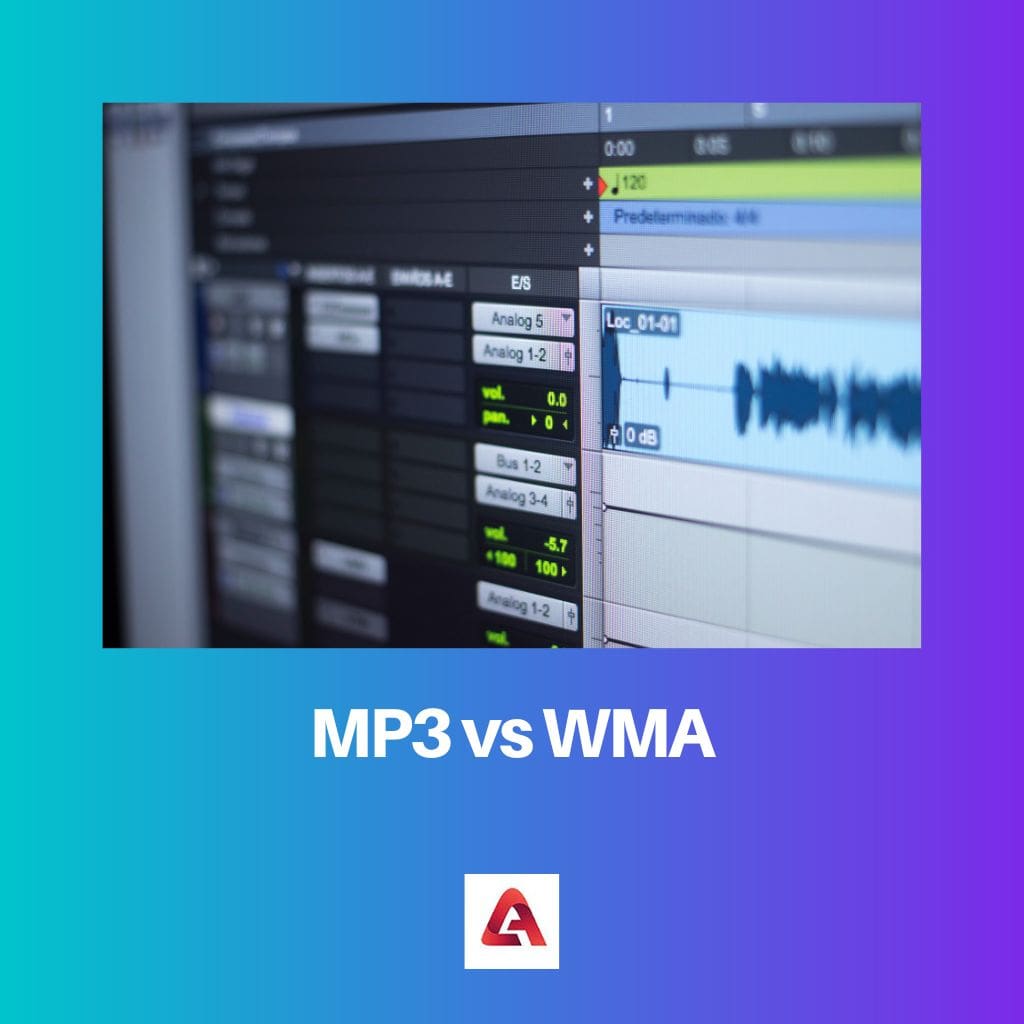After the development of the MP3 format, CD players became less popular. MP3 format compressed the data to less than 10% of the actual CD file without losing quality.
Now, there are numerous encoding algorithms for digital audio files. The two most popular ones are MP3 formats and WMA formats.
Both mp3 and WMA are well suited to many devices and help compress audio files.
Key Takeaways
- MP3 (MPEG-1 Audio Layer 3) is a widely used audio compression format that reduces file size while maintaining sound quality, making it suitable for portable devices and streaming services.
- WMA (Windows Media Audio) is an audio compression format developed by Microsoft, offering similar file size reductions and sound quality but with better digital rights management (DRM) support.
- MP3 and WMA are audio compression formats that reduce file size while preserving sound quality, but MP3 is more universally compatible. At the same time, WMA has stronger DRM capabilities and is primarily used in the Windows ecosystem.
MP3 vs WMA
MP3 is a type of file format which uses encoder for data compression and production of good quality sound. This format is supported by almost all types of devices. They can be downloaded easily because of their small size. Windows Media Audio (WMA) is a file format developed by Microsoft. This format is not support by all the devices.

Comparison Table
| Parameters of Comparison | MP3 | WMA |
|---|---|---|
| Encoder | MP3 uses the Lame encoder to compile the data and produce better sound. | WMA uses its encoder developed by Microsoft for compressing the data and producing better sound. |
| Support | Most of the multimedia supports MP3 format. | Not many multimedia support the WMA format. |
| Sound | MP3 does not produce good sound as compared to WMA. | WMA produces better sound as compared to MP3. |
| Proprietary | MP3 is not a proprietary format. | WMA is a proprietary format. |
| Storage space | MP3 uses more storage space as compared to WMA. | WMA uses less storage space as compared to MP3. |
What is MP3?
MP3 is a digital format used for creating premium-quality sound files. It has modified how people buy and listen to music.
It is a digital music file that uses a lossy compression mechanism where the data considered useless is eliminated.
MP3 is considered the most famous audio format in the world. It is considered so because of many reasons.
The main advantage of the MP3 format is that it can compress files, making it an appropriate, flexible, and favorable method of storing music.
One must convert the mp3 files with an encoder to get the best sound quality. The encoder helps to compress the data and get good-quality sound. MP3 uses the Lame encoder to perform the task.
Advantages of MP3:
- MP3s are well supported by almost every type of music device.
- The sound standard of MP3 varies from 32 kbps to 320 kbps, and it is linear to the bitrate.
- Mp3s roughly use 1/10 the space of a lossless music CD and still provide a good quality sound system.
- The file sizes are small, so you can quickly email or download mp3s.
- Many programs support mp3s, such as iTunes, Real Player, and Windows media player.
Disadvantages of MP3:
- MP3 uses more storage space than WMA format.
- It has poor sound quality as compared to the Wma format.
- There is a loss of sonic details with higher frequencies and low bitrates.

What is WMA?
WMA stands for Windows Media Audio. It is a digital file format developed by Microsoft in 1999, and it uses almost the same principle as MP3 to decrease the file’s size. It is in both an audio file format and an audio codec.
It has 4 codecs:
- WMA- This was the original codec developed in 1999.
- WMA Pro- This was developed in 2003 and had better sound quality than WMA. It is an improved lossy codec.
- WMA Lossless- This lossless codec compresses a file without losing quality.
- WMA Voice- This is a lossy codec developed for voice playback applications.
Compared to MP3, very few programs support WMA as a proprietary format. If one wants to open WMA on Windows, he will either have to install a new application or convert the file into a different format. Windows has developed its encoder.
Advantages:
- It has better sound quality than MP3, even in low bitrates like 64 KBS.
- It is better than non-lame mp3 and has high-frequency details.
- WMA is appropriate for Windows users.
Disadvantages:
- WMA has less support from other platforms as compared to MP3.
- It has compatibility issues as it is a proprietary format.
- When compressing audio, WMA loses some quality.
- It is not better than the Lame MP3.

Main Differences Between MP3 and WMA
- MP3 was originally developed in 1993 by the Fraunhofer Institute to create an audio file that could compress data without using too much space. WMA was developed in 1999 by Microsoft. It used the same principle to reduce the original size of the file.
- The software which is responsible for compressing the data and producing high-quality sound is the Encoder. MP3 uses the Lame encoder for compressing the data and producing good-quality sound, whereas Microsoft uses its own developed encoder for the same purpose.
- Many programs support mp3s, such as iTunes, Real Player, and Windows media player. Not many programs support WMA because it is a proprietary format.
- As compared to WMA, MP3 does not produce much good sound. WMA produces better sound as compared to MP3.
- MP3 uses more storage space as compared to WMA.
- WMA is not as popular as MP3, as many multimedia programs support MP3.
- MP3 is not a proprietary format, whereas WMA is a proprietary format.


I appreciate the clear explanation of the advantages and disadvantages of both MP3 and WMA. It made the decision-making process easier when considering which format to use.
The detailed comparison of MP3 and WMA allowed for a deeper understanding of their functionalities and compatibility with different platforms.
The article’s structure and analytical approach to debunking the myths and facts about MP3 and WMA were truly impressive.
The article provided a thorough examination of the differences between MP3 and WMA, making it easier to understand which format would be best suited for different devices and systems.
Yes, it was an enlightening read that explored the nuances of MP3 and WMA formats with clarity and depth.
This article went above and beyond in unraveling the intricacies of MP3 and WMA, providing a holistic understanding of their features and performance.
The elucidation of MP3 and WMA formats was both informative and enriching. The article successfully disentangled the complexities of these audio formats.
Absolutely, the detailed exploration of MP3 and WMA serves as a valuable resource for individuals seeking clarity on these audio compression formats.
This article provided an insightful analysis of the strengths and limitations of both MP3 and WMA, guiding readers toward a better understanding of these audio formats.
The article’s comprehensive discussion about MP3 and WMA made it a compelling read, helping readers make informed choices regarding audio formats.
Absolutely, the comparison table and detailed overview provided clear insights into the distinctions between MP3 and WMA.
Great insight into the development of MP3 and WMA formats. I appreciate the thorough comparison between the two.
Both MP3 and WMA have their unique advantages and disadvantages, and you’ve presented them very clearly.
The discussion about the advantages and disadvantages of both MP3 and WMA was comprehensive and well-stated. Thank you for the informative piece.
The discussion about MP3 and WMA was engaging and enlightening. It’s refreshing to see such a well-structured and informative piece on audio formats.
The detailed overview and comparison of MP3 and WMA formats are commendable. I thoroughly enjoyed reading it.
Agreed, the article provided a comprehensive breakdown of the MP3 and WMA formats, dispelling any misconceptions and allowing for informed decisions.
The article provided valuable information about the development and advantages of both MP3 and WMA. The differences in storage space and sound quality were made clear.
Yes, it’s interesting to see how these audio compression formats have evolved and the distinct features of MP3 and WMA.
The detailed explanation about the differences in sound quality and file size reductions between MP3 and WMA is fascinating. I learned a lot!
I found it surprising that WMA actually has better sound quality than MP3 in low bitrates. This was an eye-opening read for me.
Absolutely, the article provided a clear and unbiased comparison of MP3 and WMA, shedding light on their pros and cons.